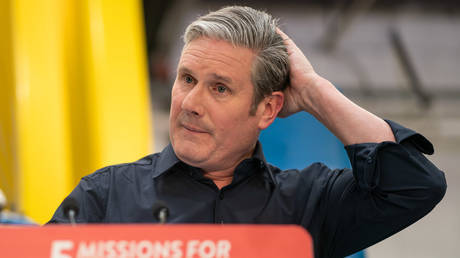Casey Means, a former surgeon, CEO of Levels, and author of the best-seller “Good Energy.”
The Joe Rogan Experience/Avery
Dr. Casey Means and her brother Calley are helping shape RFK Jr’s new approach to America’s health.She left conventional healthcare to advocate for people to take more direct control of their health.In a best-selling book “Good Energy,” she makes a case that modern diseases are rooted in metabolic health.
A Stanford-trained surgeon who pivoted to build a booming health tech start-up could be a major player in the upcoming campaign to “Make America Healthy Again.”
Dr. Casey Means is CEO and cofounder of Levels, which aims to give people more direct control of their health via wearable tech that offers real-time updates on their blood sugar levels, and raised millions of dollars in funding from big-name investors like Marc Andreessen.
“I believe that every single person absolutely can understand the basics of metabolism and of their biomarkers and learn how to be the CEO of their own health,” she told Business Insider in May in an interview about Levels. “One of the reasons why I left the conventional healthcare system is because I actually felt it was so infantilizing to patients and made it more complicated than it needed to be.”
Wellness is a family affair for Means. Her brother Calley is a former food and pharmaceutical consultant who interned for John McCain’s presidential campaign. He helped coordinate the first chats between now President-elect Donald Trump and Robert F. Kennedy Jr., his recent pick to lead the Department of Health and Human Services, the Wall Street Journal reported.
Together, the pair have built a major following on wellness-related topics.
They are co-authors of the best-selling book “Good Energy” and advisors to Kennedy, who has made “Make America Healthy Again” — or, MAHA — his mantra.
Robert F. Kennedy Jr. is a fan of Casey Means’ work and views in the wellness space.
Rebecca Noble/Getty Images
The siblings have been featured on high-profile platforms like the Tucker Carlson Show and Joe Rogan’s podcast, calling for a shift from the current model of “sick care” by doctors playing the role of middlemen between individuals and their health and offering people actionable steps to take their health into their own hands with nutrition and exercise. Means said on Rogan’s podcast that the realization was an “awakening” in her career.
“There’s a really unfortunate landscape in our country where individuals are essentially at the mercy of the information that their doctor chooses to give them and how deeply it’s explained,” Means told BI in May.
The overarching philosophy is that metabolism is the foundation of good health, the key to addressing Americans’ overwhelming rates of chronic disease, and that individual healthy habits can help achieve it. Here’s what we know about Casey Means’ priorities.
Her mantra is that a healthy metabolism can reverse many health conditions
Means’ book promotes the pursuit of Good Energy, which she defined as great metabolic health. “It governs the very essence of what (quite literally) makes you tick,” she said in the book, “whether your cells have the energy to do their jobs of keeping you nourished, clear-minded, hormonally balanced, immune protected, heart-healthy, structurally sound — and so much more.”
According to Means, roughly 93% of US adults have “Bad Energy,” or poor metabolic health. She attributes conditions like depression, infertility, heart disease, type 2 diabetes, erectile dysfunction, cancer, and Alzheimer’s to habits like eating ultra-processed foods and sleep deprivation. Means argues that inflammation and oxidative stress, unstable molecules that cause cell damage, underpin these modern diseases.
In the scientific community, there’s consensus with Means about the importance of maintaining a healthy metabolism, which is often associated with weight loss and can also reduce the risk factors of heart disease, stroke, and type 2 diabetes. Studies also show some links between metabolic health and depression.
However, Means has also been criticized for exaggerating health risks, such as stating in her book that “each additional serving of ultra-processed food we eat” increases early mortality by 18%, referencing a 2019 study conducted in Spain.
“I’ve easily had 1000 bags of chips in my life,” Brad Stulberg, an adjunct professor of health management and policy at the University of Michigan posted on X. “If this is true, it means my mortality risk has increased by 18,000 percent.”
Too much emphasis on metabolism also risks oversimplifying health, according to Christy Harrison, a registered dietitian and nutrition writer behind the Substack “Rethinking Wellness.”
“I’m automatically suspicious of anyone who claims they’ve identified the ‘one true cause’ of all diseases. That’s typically just a way of selling you something,” she told Business Insider. “The human body and disease processes are far too complex to pin on one single ‘root cause,’ even though I know from experience that that idea can be so appealing.”
Means is critical of the US healthcare system, urging readers to ‘trust yourself, not your doctor’
In the book, Means criticizes the healthcare system, drawing from her experience in medical school and work as a surgeon. Calley Means similarly criticizes the pharmaceutical industry after working as a lobbyist.
“Every institution that impacts your health makes more money when you are sick and less when you are healthy — from hospitals to pharma to medical schools, and even insurance companies,” she said.
Casey Means has a business that helps people track their blood sugar levels through a wearable monitor — something people with diabetes have done for years, but is new for the general public.
Illustration by Matt Harbicht/Getty Images for Tandem Diabetes Care
Means, who runs a wearable glucose monitor business, promotes a more individualized approach to health in her book. She recommends wearing a fitness tracker, using continuous glucose monitors, and reading your own lab results rather than depending on a doctor to interpret them for you. The book has a section outlining how to analyze your bloodwork results to make sure you have Good Energy.
While she still says you should see doctors for acute, life-threatening problems and emergencies, she advises against trusting doctors for chronic issues like high cholesterol and PCOS.
She espouses popular advice around diet, exercise, and sleep
Throughout the book, Means promotes widely agreed-upon health advice. She recommends a diet rich in fiber and antioxidant-packed fruits and vegetables while cutting ultra-processed foods. She also encourages eating foods with nutrients like vitamin C, magnesium, and omega-3 fatty acids, hydrating throughout the day, and avoiding plastic packaging.
Additionally, she emphasizes following a consistent sleep schedule (at least seven hours of sleep a night) and reducing screen time before bed. She also suggests getting regular exercise such as walking at least 7,000 steps per day and strength-training a few times a week.
Means also shared common mental health tips, such as seeing a therapist, maintaining a sense of community, and practicing mindfulness via meditation and yoga.
Applying cutting-edge science to everyday life
Means’ views on cold plunging align with those from popular science podcasters like Andrew Huberman and Dr. Peter Attia.
Halfpoint Images/Getty Images
Many of Means’ suggestions for healthy habits are based in developing research on lifestyle strategies that have the potential to help us live longer or better, but are still being studied to work out what the effects might be in larger-scale, real-world scenarios.
She advocates for intermittent fasting, a massively popular nutrition plan that involves limiting meals and snacks to a set window of time, in this case, 14-hours a day. Fasting has emerged as a promising area of study for improving weight loss, managing blood sugar, and potentially even extending lifespan or fighting diseases like cancer.
She also recommends reducing plastic use, filtering water, and eating organic produce and grass-fed meat and dairy to avoid exposure to chemicals ranging from PFAs to pesticides.
Along with routines like cold plunging, these recommendations align with those from popular science podcasters like Andrew Huberman and Dr. Peter Attia. Together they’re part of a trend toward optimization, fine-tuning the details of our behaviors based on what we can glean from the latest research studies. Many of the strategies are experimental, often based on small-scale studies or animal models, and the proposed benefits can sometimes go beyond what current data has shown.
Harrison previously wrote that the trend often highlights “early-stage research that isn’t ready for prime time” and is meant to provide a path for further research, not actionable advice for lifestyle changes.
“In terms of potential benefits, I suppose some people might find it helpful to follow small, early-stage studies and try out their recommendations to see if anything works. But again, most of those theories won’t be borne out in future scientific research,” Harrison told BI.
“In my mind, when it comes to scientific research, anything touted as ‘cutting edge’ is worth an extra dose of skepticism,” she said.
Talking points like seed oils and self-testing push back against established advice
In some online wellness circles, seed oils have been blamed for everything from the obesity epidemic to sunburn, running against the grain of mainstream dietary advice.
Meredith Schneider
Some of Means’ advice is in contrast to what mainstream medical experts frequently recommend.
She advises cutting out seed oils like canola oil, a common ingredient in processed foods and restaurant meals. In some online wellness circles, seed oils have been blamed for everything from the obesity epidemic to sunburn, despite a general consensus among dietitians that the oils are safe and even healthy in moderation.
Means also encourages direct-to-consumer medical testing such as a $500 lab panel on metrics like cholesterol levels, hormones, and immune system functions. The concept builds on her work with Levels in giving people the ability to see how their daily choices might be affecting their health by looking at the data for themselves instead of waiting months or longer for doctors’ visits.
The shift is appealing because, despite ballooning healthcare costs, life expectancy is stagnating. Frustration with medical providers is on the rise as patients navigate complex bureaucracy and sometimes outright gaslighting in the doctor’s office, and wariness about the influence of pharmaceutical companies is spiking, too.
An individualized approach to health with daily routines offers a way to feel in control, but research suggests factors on a much broader societal scale have a much bigger impact, accounting for up to 70% of health outcomes on a population level.
“Metabolic health certainly is important to overall well-being, but so are many other factors, including economic stability, social and community environment, access to and quality of care, and other social determinants of health,” Harrison said.





+ There are no comments
Add yours